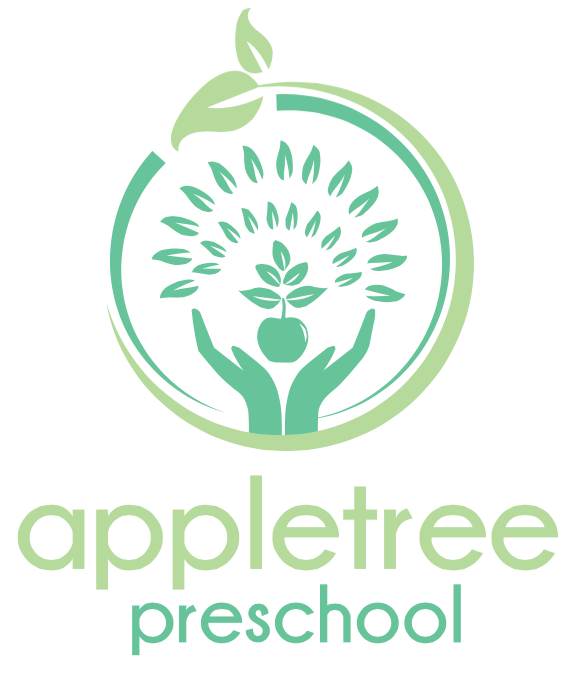Pre-kindergarten Program:
Appletree’s Pre-K 4 Voyagers Program provides children ages 4 ½ -5 ½ with all the necessary tools and beyond to begin their journey into kindergarten. The Voyagers’ curriculum prepares our learners by advancing their social, emotional, physical, and cognitive skills. Our Pre-K 4 Teachers follow our thoughtfully prepared curriculum to focus on engaging in higher order thinking, developing number sense, cleaning up after themselves and even introducing chapter books.
Appletree also aims to:
- Provide hands-on experiences connected to a variety of activities and subjects, including math, social studies and science
- Practice reciting, recognizing in print, and writing the upper and lower-case alphabet and numbers (up to 100), shapes and colors as well as beginning and ending consonant sounds and age appropriate sight words
- Working with partners, in small groups, at cooperative learning, and center-related activities
- Increasing independence
- Assigning jobs and tasks to develop responsibility
- Master proper pencil grip and use of scissors
- Following multi-step directions with ease
Pre-K Developmental Milestones
The list below, although not exhaustive, shows the key abilities and processes Appletree Preschool focuses on for our Pre-K class!
Cognitive Development
- Understands the idea of “same” or “different”
- Draws a person with 5 or more body parts
- Understands the order of daily routines (brushing teeth before going to bed)
- Follows multi-step directions without confusion
- Counting and recognizing numbers up to 30
- Understands the difference between fiction and non-fiction
- Identifies sequence of events
- Recite their name, address and phone number
- Recalls information from stories
- Asks and answers appropriate questions about stories
- Connects events, characters, and actions in stories to specific experiences
- Compares and contrasts
- Recognizes cause and effect
Physical Development: Large/Gross Motor Skills
- Accomplishes the skills of running at speed and jumping over objects
- Manages body movements and build team effort skills through relay running and obstacle courses
- Catches a ball thrown from a distance of five feet
- Stands on one foot for ten seconds or longer
- Moves with balance and control
- Pedals and steers a tricycle or bike
Physical Development: Small/Fine Motor Skills
- Develop hand-eye coordination by tracing, drawing shapes, and other manipulatives.
- Master cutting, gluing, and coloring skills through our daily activities and art
- projects that become complex over the year
- Master proper handwriting position through daily handwriting exercises.
- Dresses and undresses without assistance
Communication and Language Development
- Comprehends and responds to books and other texts
- Enhancing vocabulary by learning sight words and practicing sentence structure
- Sharing ideas and asking questions through Show & Tell
- Recall a simple story in sequence by listening to a story and repeating back some major points
- Phonics skills including letter and sound recognition
- Demonstrates phonemic awareness by noticing rhyme and smaller units of sound
- Developing early writing skills by writing in journals
- Demonstrates varied uses of language (e.g., requesting, commenting, using manner words, problem-solving)
Creative Development
- Explores visual materials and activities
- Shows care and persistence in a variety of art projects
- Creates original work
- Expresses self through movement
- Demonstrates ability to use movement and music
- Represents fantasy and real-life experiences through pretend play
- Participates in teacher-guided dramatic activities
- Engages in cooperative play with other children
- Uses oral language to describe or explain art
Science and Social Study Skills
- Observing life cycles
- Experimentation with various materials
- Learns about weather, season, plants, animals, senses, hygiene, nutrition
- Acquire knowledge of national holidays through books, songs, and other
- activities
- Learns about themselves as individuals
- Learn about the basic elements of community: community helpers and
- neighborhoods
Mathematical Skills
- Counting using one to one correspondence
- Recognize and match objects more than 10
- Developing and understanding concepts of greater than or less than using concrete objects
- Basic understanding of addition and subtraction
- Recognizing, sequencing, and creating patterns
- Sorting and ordering geometric shapes and objects by color, shape, and size.
- Represent concrete data by learning how to graph data
- Understanding and implementing positional words by learning concept of time: before, after
- Measurement
- Comprehending the concepts of time including seasons, months and days of the year

